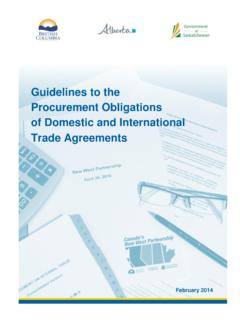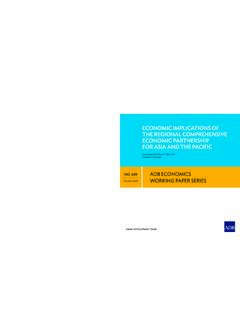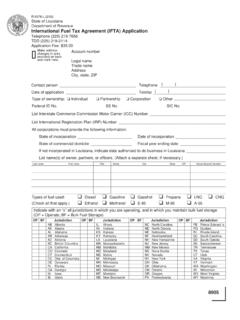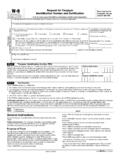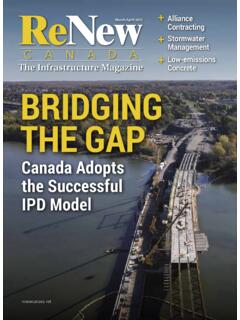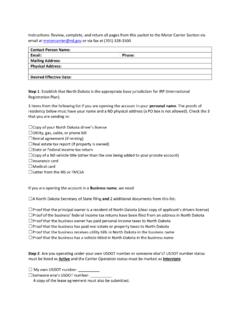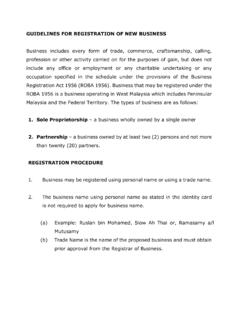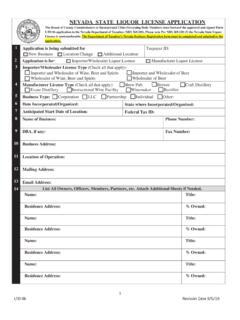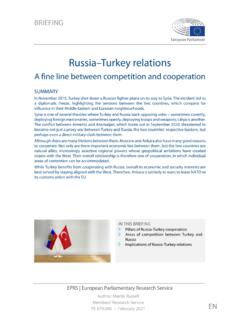Transcription of Procurement Guidelines - New West Partnership Trade
1 Guidelines to the Procurement Obligations of Domestic and International Trade Agreements December 2021. This document is intended to assist procuring entities in understanding their Procurement obligations under the Trade agreements. This document is not intended to be an interpretive guide, does not constitute legal advice, and does not replace the specific obligations of the Trade agreements. Guidelines to the Procurement Obligations of Domestic and International Trade Agreements | December 2021 1. Guidelines to the Procurement Obligations of Domestic and International Trade Agreements | December 2021 2. CONTENTS. TERMS USED IN THESE 5. PART A: INTRODUCTION .. 9. I Purpose of the Guidelines .. 9. II Application and Scope .. 9. III Thresholds .. 9. PART B: GENERAL OBLIGATIONS ..11. I Openness ..11. II Non-Discrimination ..11. III Non-Circumvention ..11. IV Transparency ..11. V Illustrative PART C: Procurement PROCEDURES ..15. I Valuation ..15. II Electronic III Time to Prepare and Submit Tenders.
2 16. IV Tender Notices ..17. V Tender Documentation ..18. VI Prequalification ..20. VII Evaluation ..21. VIII Contract IX Access to Bid Protest Mechanism for X Exceptions or Qualifications ..24. SCHEDULE A: NEW west Partnership Trade agreement ..25. SCHEDULE B: CANADIAN FREE Trade SCHEDULE C: WORLD Trade ORGANIZATION agreement ON GOVERNMENT. Procurement ..35. SCHEDULE D: CANADA EUROPEAN UNION COMPREHENSIVE ECONOMIC AND. Trade agreement ..43. SCHEDULE E: COMPREHENSIVE AND PROGRESSIVE agreement FOR TRANS- PACIFIC Partnership ..53. Guidelines to the Procurement Obligations of Domestic and International Trade Agreements | December 2021 3. Guidelines to the Procurement Obligations of Domestic and International Trade Agreements | December 2021 4. TERMS USED IN THESE Guidelines . These definitions apply only to these Guidelines and do not necessarily align with the definitions used in the Trade agreements. Different Trade agreements may define the same term differently. Refer to each Trade agreement for definitions specific to those agreements: commercial goods or services means goods or services of a type generally sold or offered for sale in the commercial market place to, and customarily purchased by, non- government buyers for non-government purposes.
3 Construction means a construction, reconstruction, demolition, repair or renovation of a building, structure or other civil engineering work;. covered Procurement means a Procurement whose estimated value meets or exceeds the applicable threshold of a Trade agreement and is not otherwise excluded;. Crown corporations means Crown corporations, government-owned commercial enterprises, and other entities that are owned or controlled by the provinces of British Columbia, Alberta, Saskatchewan or Manitoba through ownership interests;. estimated value refers to the maximum total value of the Procurement , whether awarded to one or more suppliers, taking into account all forms of remuneration to be paid to a supplier, including premiums, fees, commissions, and interest;. limited tendering means a Procurement method whereby the procuring entity contacts a supplier or suppliers of its choice;. MASH means regional, local, district or other forms of municipal government, school boards, publicly-funded academic, health and social service entities, as well as any entity owned or controlled by any one of the preceding.
4 Measure includes any legislation, regulation, standard, directive, requirement, guideline, program, policy, administrative practice or other procedure and includes any action of a procuring entity regarding covered procurements;. Ministries means departments, ministries, agencies, boards, councils, committees, commissions, and similar provincial agencies;. person means a natural person or an enterprise;. prequalification means a process whereby a procuring entity establishes a list of suppliers capable of responding to a specific requirement;. Procurement means the acquisition by any means, including by purchase, rental, lease or conditional sale, of goods, services or construction, but does not include: (a) any form of assistance that a procuring entity provides, including cooperative agreements, grants, loans, equity infusions, guarantees or fiscal incentives; or Guidelines to the Procurement Obligations of Domestic and International Trade Agreements | December 2021 5. (b) provision by government organizations, including government entities, of goods and services to persons or other government organizations, including government entities.
5 Procuring entity means any one of the following entities, when undertaking a Procurement : (a) a Ministry;. (b) a Crown corporation; or (c) a MASH entity, as those terms are defined, above;. standard means a document approved by a recognized body that provides for common and repeated use, rules, Guidelines or characteristics for goods or services, or related processes and production methods, with which compliance is not mandatory. It may also include or deal exclusively with terminology, symbols, packaging, marking or labelling requirements as they apply to a good, service, process or production method;. supplier means a person or group of persons that provides or could provide goods or services;. technical specification means a tendering requirement that: (a) lays down the characteristics of goods or services to be procured, including quality, performance, safety and dimensions, or the processes and methods for their production or provision; or (b) addresses terminology, symbols, packaging, marking or labelling requirements as they apply to a good or service.
6 Tender refers to a competitive offer to provide goods, services or construction made by a supplier to respond to a tender notice;. tender notice means a notice published by a procuring entity inviting interested suppliers to submit a tender in response to a request for proposal, request for quotation, a request for prequalification, or other form of Procurement request;. Trade agreement means the following international and domestic Trade agreements: (a) the New west Partnership Trade agreement (NWPTA), ;. (b) the Canadian Free Trade agreement (CFTA), ;. Guidelines to the Procurement Obligations of Domestic and International Trade Agreements | December 2021 6. (c) the Canada European Union Comprehensive Economic and Trade agreement (CETA), accords-commerciaux/agr-acc/ceta-aecg/te xt- ;. (d) the World Trade Organization agreement on Government Procurement (GPA), ; and (e) The Comprehensive and Progressive agreement for Trans-Pacific Partnership (CPTPP), accords-commerciaux/agr-acc/cptpp- Guidelines to the Procurement Obligations of Domestic and International Trade Agreements | December 2021 7.
7 Guidelines to the Procurement Obligations of Domestic and International Trade Agreements | December 2021 8. PART A: INTRODUCTION. I Purpose of the Guidelines These Guidelines have been developed by the Governments of British Columbia, Alberta, Saskatchewan and Manitoba to assist their procuring entities in understanding Procurement - related obligations under domestic and international Trade agreements. Each Trade agreement includes Procurement obligations based on the principles of non- discrimination, openness and transparency, and reflects a commitment to effectively manage public resources. II Application and Scope Not all government procuring entities are covered under each of the Trade agreements. Further information on the specific coverage of each of the Trade agreements is included in Schedules A. to E. III Thresholds Procurement obligations under the Trade agreements are triggered when a procuring entity contemplates a Procurement valued at or above certain specified thresholds.
8 A Procurement that falls below all of the applicable thresholds is not subject to the Procurement obligations of any Trade agreements. Guidelines to the Procurement Obligations of Domestic and International Trade Agreements | December 2021 9. As of January 2022, these thresholds are: Trade Procurement Ministries/. Crown Corporations MASH. agreement Type Departments Goods $10,000 $25,000 $75,000. NWPTA Services $75,000 $100,000 $75,000. Construction $100,000 $100,000 $200,000. Goods $30,300 $605,600 $121,200. CFTA Services $121,200 $605,600 $121,200. Construction $121,200 $6,056,100 $302,900. Goods $366,800 $651,000 1. $366,800. CETA Services $366,800 $651,000 $366,800. Construction $9,100,000 $9,100,000 $9,100,000. Goods $366,800 $651,000 2. $366,800. UK Services $366,800 $651,000 $366,800. Construction $9,100,000 $9,100,000 $9,100,000. Goods $651,000. WTO/GPA Services $651,000 Not covered Construction $9,100,000. Goods $651,000. CPTPP Services $651,000 Not covered Construction $9,100,000.
9 NOTE: Thresholds for the CFTA, CETA, UK, GPA and CPTPP are adjusted every two years. The next update will occur in January 2024. Additional information on specific coverage, exclusions and other criteria contained in each of the Trade agreements is identified in Schedules A to E. 3. 1 Entities with any of the following core activities are subject to a threshold of $733,600 for goods and services: production, transport, or distribution of drinking water, electricity, gas or heat; the treatment of wastewater; and public transportation. This threshold is also adjusted every two years. 2 Entities with any of the following core activities are subject to a threshold of $733,600 for goods and services: production, transport, or distribution of drinking water, electricity, gas or heat; the treatment of wastewater; and public transportation. This threshold is also adjusted every two years. 3 The Canada-UK Trade Continuity agreement coverage, exclusions and other criteria is identical to the CETA.
10 Guidelines to the Procurement Obligations of Domestic and International Trade Agreements | December 2021 10. PART B: GENERAL OBLIGATIONS. Under all of the Trade agreements procuring entities must ensure that covered procurements meet the following four general obligations: I Openness 1. All eligible suppliers that meet the essential requirements for a specific covered Procurement must be given the opportunity to submit a tender. 4. II Non-Discrimination 1. Procuring entities must accord no less favourable treatment to goods, services and suppliers of other jurisdictions that are parties to a Trade agreement than the best treatment the procuring entity provides to goods, services and suppliers of their own or any other jurisdiction. III Non-Circumvention 1. Procuring entities must not: (a) prepare, design or otherwise structure a Procurement , or (b) select a valuation method or divide Procurement requirements, in order to avoid the obligations of the Trade agreements. 2. Where a procuring entity uses a third party to conduct procurements on its behalf, the third party must ensure such procurements meet the procuring entity's Trade agreement Procurement obligations.

